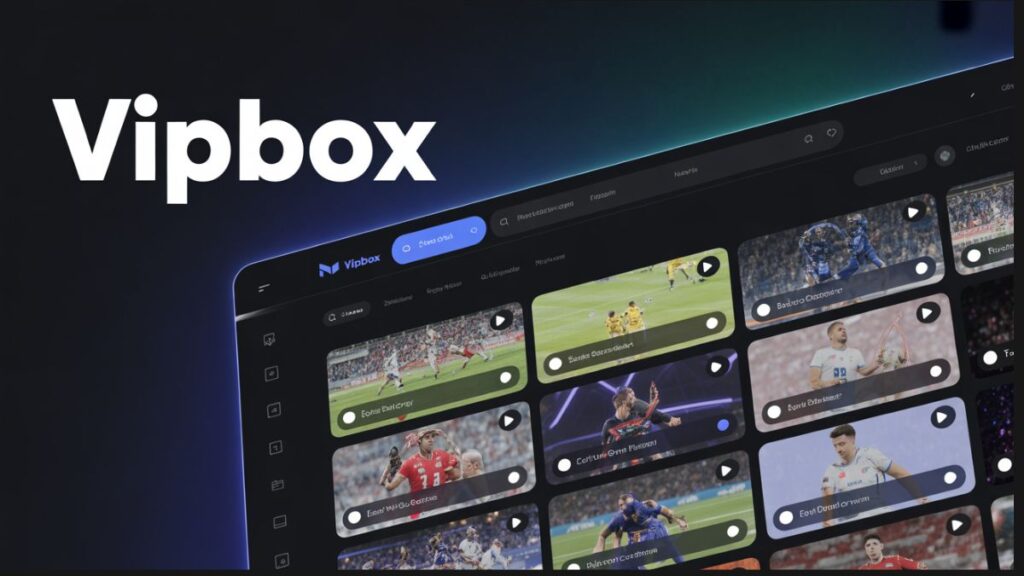In the fast-evolving digital landscape, access to live sports content has become a top priority for fans worldwide. With rising subscription costs for official broadcasters and geo-restrictions limiting access, many users turn to free or low-cost alternatives—often landing on platforms like VIPBox. While it promises free live streaming of major sporting events, VIPBox is a name that sparks heated debate among users, legal experts, and content creators alike. This article provides a detailed, balanced, and thoroughly researched exploration of VIPBox—its history, functionality, legal implications, risks, and safer alternatives.
Whether you’re a sports enthusiast looking for streaming options, a concerned parent, or someone simply curious about online piracy trends, understanding VIPBox is essential in today’s media-saturated world.
Introduction: The Rise of Free Sports Streaming
The demand for real-time access to sports events—football (soccer), basketball, boxing, tennis, MMA, and more—has skyrocketed over the past decade. Official broadcasters such as ESPN, Sky Sports, DAZN, and regional sports networks invest billions in broadcasting rights, and naturally, they recoup these costs through subscriptions, pay-per-view models, or bundled cable packages.
However, not all fans have the means—or willingness—to pay for premium services. This gap has given rise to unofficial streaming platforms, with VIPBox being one of the most recognizable names in the space since the early 2010s.
Unlike licensed services, VIPBox does not produce or host video content directly. Instead, it acts as an aggregator or directory, linking users to third-party streams—often hosted on servers located in jurisdictions with lax copyright enforcement.
This model has allowed VIPBox to remain surprisingly resilient, even as authorities crack down on piracy. But what exactly is VIPBox, and why does it remain widely discussed—despite its legal gray (or outright black) status? Let’s dive in.
What Is VIPBox?
VIPBox is a free online platform that provides live links to sports broadcasts from around the world. It does not stream matches itself. Rather, it functions as a hub that collects and organizes embed links—typically sourced from peer-to-peer (P2P) networks, unlicensed IPTV providers, or unauthorized rebroadcasts of copyrighted feeds.
The interface is typically straightforward: users land on a homepage listing upcoming or ongoing events (organized by sport and league), click a match, and are redirected (sometimes through multiple pop-ups or ad layers) to a working stream—often embedded in an iframe or hosted on a third-party domain like StreamHd, SportHD, or similar.
Key features usually include:
- Real-time match schedules
- Multiple streaming links per event (for redundancy)
- Minimal or no registration required
- Mobile-friendly design (though quality varies)
Originally launched in the early 2010s, VIPBox gained notoriety during major global sporting events—such as the FIFA World Cup, UEFA Champions League finals, and the Olympics—when viewership spikes and mainstream access barriers (e.g., national blackouts or paywalls) push fans toward unofficial sources.
Despite frequent domain changes (e.g., vipbox.tv, vipbox.co, vipbox.one, vipbox.sx), the core service has remained functionally consistent: free access, high risk, zero accountability.
How Does VIPBox Work?
Technically, VIPBox operates using a multi-layered approach:
1. Link Aggregation
VIPBox scrapes or manually curates streaming URLs from various sources. These URLs are often pulled from forums, Telegram channels, or automated bots monitoring illicit stream pools.
2. Embedding & Redirection
Once a link is verified (often via user reports or automated checks), it’s embedded on the VIPBox site. Users click, and—after enduring a barrage of pop-up ads—are sent to the actual stream, which resides on an external server.
3. Domain Rotation & Mirror Sites
To evade takedowns, VIPBox frequently rotates domains and employs mirror sites. When one domain (e.g., vipbox.live) gets blocked or seized, a new one (e.g., vipbox247.net) replaces it within hours. These domains are often registered via privacy-protected services in offshore jurisdictions.
4. Monetization Through Ads
VIPBox generates revenue almost exclusively through intrusive advertising:
- Pop-unders and pop-overs
- Malvertising (malicious ads delivering malware)
- Redirect chains to scam or phishing pages
- Forced ad-blocker detection
There is no paid tier—no “premium” account—to remove ads. The entire business model thrives on high traffic volume and minimal overhead.
While users may get “free” streams, the hidden costs—in data exposure, malware risk, and degraded user experience—are significant.
Legal Status of VIPBox
Here’s the unequivocal truth: VIPBox is illegal in most countries.
Copyright Infringement
Broadcasting rights for sports events are licensed exclusively to authorized networks (e.g., NBC Sports, beIN Sports, SuperSport). By redistributing these signals without permission, VIPBox and its stream sources violate copyright law—specifically, the communication to the public right under international treaties like the Berne Convention and the WIPO Copyright Treaty.
Court Actions & Takedowns
Authorities have repeatedly targeted platforms like VIPBox:
- In 2019, the European Union Intellectual Property Office (EUIPO) listed VIPBox among the top piracy threats to sports rights holders.
- The UK’s Premier League has successfully obtained court injunctions forcing ISPs to block access to VIPBox domains.
- In the U.S., the Digital Millennium Copyright Act (DMCA) gives rights holders the ability to issue takedown notices; repeated violations can lead to domain seizures by ICE (U.S. Immigration and Customs Enforcement).
That said, enforcement remains challenging due to:
- Offshore hosting (e.g., in Russia, Ukraine, or Southeast Asia)
- Use of bulletproof hosting providers (unwilling to comply with takedown requests)
- Rapid domain cycling
Thus, while VIPBox is de jure illegal, it persists de facto due to jurisdictional loopholes and resource asymmetry—rights holders can’t chase every mirror site.
User Liability: Are You at Risk?
While legal action against individual users is rare (especially for passive viewing), it’s not impossible. In countries like Germany, France, and the UK, ISPs have been known to send warning letters to subscribers accessing known piracy sites. Fines or throttled bandwidth are potential consequences.
In the U.S., the Copyright Act focuses on distribution, not viewing—so merely watching a stream is not a federal crime. However, using tools like Kodi add-ons or dedicated piracy apps could cross into contributory infringement territory.
Bottom line: VIPBox operates in a legal minefield—and users step onto it every time they click “Play.”
Risks of Using VIPBox
Beyond legality, using VIPBox exposes users to serious digital and financial risks:
1. Malware and Spyware
Many streams on VIPBox are accompanied by malicious ads (malvertising). Simply clicking a link may trigger:
- Drive-by downloads (unauthorized software installation)
- Keyloggers and info-stealers
- Ransomware payloads
A 2022 study by cybersecurity firm Digital Shadows found that over 63% of piracy sites—including VIPBox mirrors—delivered malware via compromised ad networks.
2. Phishing & Scams
Fake “upgrade your player” or “install codec” prompts often lead to credential-harvesting pages. Users may unknowingly enter credit card or login details—compromising bank accounts, social media, or email.
3. Poor Stream Quality & Reliability
Free does not mean functional. Common issues include:
- Buffering and lag (especially during peak events)
- Streams dying mid-match
- Audio-video desync
- Low resolution (360p or worse)
- Commentary in foreign languages
Unlike licensed platforms with CDN-backed infrastructure, VIPBox relies on unstable, ad-hoc sources.
4. Privacy Violations
VIPBox sites often deploy aggressive tracking scripts—cookies, fingerprinters, and pixel beacons—to profile users for ad targeting or sale to data brokers. Your browsing habits, device info, and approximate location may be harvested without consent.
Many modern browsers block such scripts by default, but older devices (e.g., smart TVs, legacy Android boxes) remain vulnerable.
Why Does VIPBox Still Exist?
If it’s illegal, risky, and low-quality—why hasn’t VIPBox disappeared?
Three main factors explain its endurance:
1. Persistent Demand
Millions globally lack affordable access to live sports. In regions without official broadcasters (e.g., sub-Saharan Africa for La Liga, or Southeast Asia for NFL), VIPBox fills a void—even if imperfectly.
2. Low Operational Cost
Running a link-aggregation site is cheap. Hosting, domain registration, and basic maintenance cost a few hundred dollars monthly. Revenue from ads can exceed thousands—creating strong financial incentive.
3. Decentralized Infrastructure
Since VIPBox doesn’t host content, there’s no central server to shut down. Even if the main domain vanishes, community-run mirrors or Telegram bots keep links circulating.
In essence, VIPBox thrives not because it’s good—but because the market for accessible sports content remains underserved.
Ethical Considerations
Beyond law and security, there’s an ethical dimension.
Sports broadcasting rights fund leagues, clubs, grassroots programs, and athlete development. When fans bypass payment systems via platforms like VIPBox, they indirectly weaken the ecosystem they love.
Consider:
- A Premier League club earns ~£160 million annually from TV rights—funds used for wages, youth academies, stadium upgrades, and community outreach.
- A smaller league (e.g., MLS or J.League) relies even more heavily on broadcast revenue for survival.
- Independent journalists, camera crews, and production staff depend on licensed streams for their livelihoods.
Choosing free streams may seem harmless—but aggregated across millions, it erodes the financial foundation of professional sports.
That said, critics rightly point out that monopolistic pricing and regional exclusivity contribute to piracy. The ethical onus isn’t solely on viewers—broadcasters must also adapt.
Safer, Legal Alternatives to VIPBox
The good news? Affordable, legal options are expanding rapidly:
✅ Official Broadcaster Apps (Often with Free Tiers)
- Tubi & Pluto TV: Offer live sports channels (e.g., Fox Sports, CBS Sports HQ) with ads—100% free and legal.
- YouTube: Many leagues (NBA, NFL, FIFA) stream select matches or highlights officially.
- FIFA+: Free global streaming of FIFA tournaments, plus archives.
✅ Budget-Friendly Subscriptions
- DAZN: ~$20/month in select markets; includes boxing, MMA, soccer.
- ESPN+: $11/month (U.S.); offers UFC, college sports, international soccer.
- Peacock: $6–$12/month; carries Premier League, WWE, Olympics.
✅ Free-to-Air (FTA) Broadcasts
Many countries still broadcast major events on public TV:
- BBC & ITV (UK): World Cup, Olympics
- ARD/ZDF (Germany): Bundesliga highlights, major tournaments
- SBS (Australia): FIFA World Cup, Tour de France
Check your local listings—sometimes the simplest solution is over-the-air antenna reception.
✅ Community Viewing
Bars, fan clubs, and community centers often host public screenings—legally licensed and socially engaging.
The Future of Sports Streaming—and Where VIPBox Fits
As technology evolves, so does piracy—and counter-piracy.
Emerging trends include:
- AI-Powered Takedowns: Rights holders deploy AI to detect and block illegal streams in real time (e.g., Friend MTS, Irdeto).
- Blockchain Verification: Some startups explore NFT-based access tokens to prove legitimate viewership.
- Geo-Flexible Licensing: Pressure is mounting on leagues to offer global, à la carte streaming (e.g., NFL Game Pass International).
Meanwhile, platforms like VIPBox will likely persist in the shadows—but their relevance may wane as legal options become cheaper, more flexible, and device-agnostic.
The ultimate solution lies not in stricter enforcement alone, but in inclusive access: fair pricing, no blackout policies, multi-language support, and mobile optimization.
Until then, VIPBox remains a cautionary tale—a symbol of what happens when innovation outpaces accessibility.
Conclusion: Understanding VIPBox in Context
VIPBox is more than just a website—it’s a symptom of a larger tension in the digital media economy. On one side: rights holders protecting investments. On the other: fans demanding equitable access. Neither side is entirely wrong—but the current stalemate benefits only ad fraudsters and cybercriminals.
Using VIPBox might seem like a harmless workaround. But the risks—malware, surveillance, legal exposure—and the ethical cost make it a poor long-term choice. Fortunately, the landscape is shifting. With smarter licensing, competitive pricing, and robust free options, the era of forced piracy could soon end.







